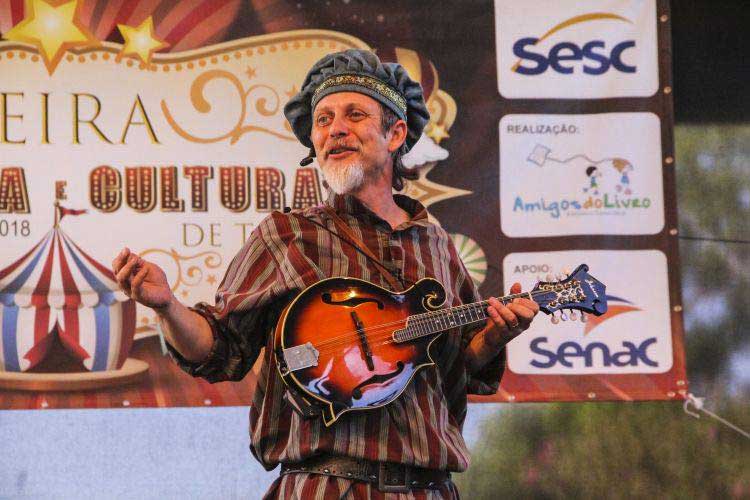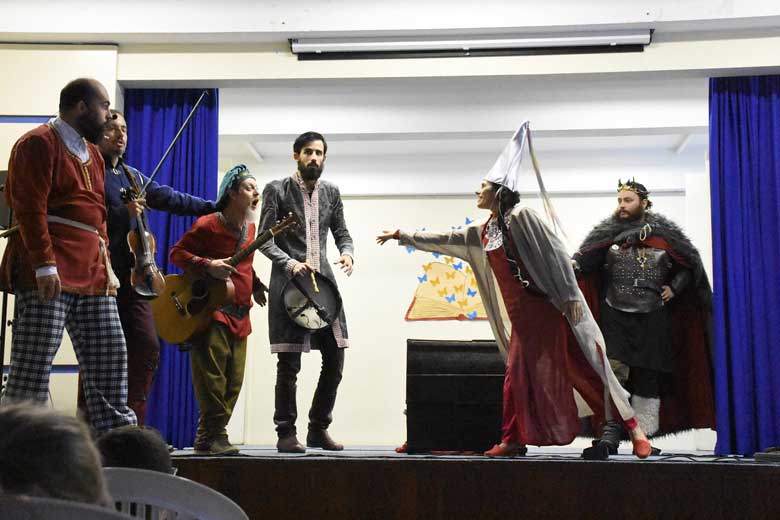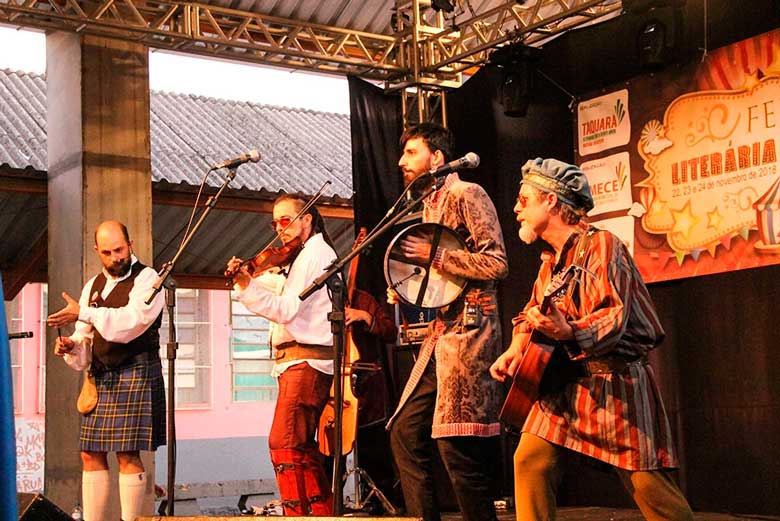We spoke with Renato Zingano Velho, founder of Bando Celta, about the past, the present and the future of this artistic collective that has given a boost to the Brazilian folk/medieval scene.
First of all, I would like to thank you for your willingness to answer this interview. Could you start with a brief history of the band? Who are you, what instruments do you play and what are the musical influences of Bando Celta’s bards? What led you to compose and play Celtic music?
The group has the official date of its creation as Saint Patrick’s Day 2013, but the cornerstone was well before that. Between 2006 and 2010 there was a musical research project, Tradisons, at Usina do Gasômetro and it was there that Bando Celta’s first cell appeared.
Coordinated by musicians Renato Velho (classical guitar, mandola, banjo and vocals) and Caio Haag (vocals and bodhran), it has the talented Leandro Dias (bagpipes, flutes and percussion) and Christian Feel (violin and electronics), Bando Celta performs with stylized Celtic costume, designed by Margarida Roche. The band’s repertoire includes, in addition to genuine Celtic songs mixed with our own compositions, versions of Brazilian songs that dialogue with this style, such as Pagode Russo, a classic of the Northeastern culture by Luiz Gonzaga.
Bando Celta released two CDs, Demo Celta (2013) and Bardos (2015); and the DVD Bardos (2015). In August 2018, itt released a book, the children’s comic Os Bardos de Erin, which also became a play where the musicians interpret its characters.

Renato Zingano Velho | Bando Celta
See also:
-
Olam Ein Sof | Medieval music made in Brazil
-
Oaklore releases the music video for ‘Branle Des Chevaux’
-
Taverna starts crowdfunding for tour and album
Saying that Bando Celta is “Celtic music band ” is perhaps not that appropriate. In addition to music, you incorporated dance into your performances, embraced the theater with the Bardos de Erin troupe and have already embarked on the literary milieu. How did the idea of exploring these other artistic segments come about? Could you talk a little about these activities?
It’s true that to say that BC is a “band” is already strange for us. We have the concept of a band as something very plastered, dated and almost stereotyped in relation to the public. We are a group or musical ensemble, to say the least. Throughout our trajectory, we have been attracting and looking for very cool people who have contributed artistically to our show and also for the development of our conception and identity such as, for example, the costume designer Margarida Roche, the circular dance focuser Pati Preiss and the tribal dance teacher Fernanda Zahira Razi.
When we decided to organize the 1st Medieval Fair in 2016, we already had friends/partners in dance, literature, costumes, video, craft beer, mead, theater, circus, crafts and so we became an Artistic Collective, that is, the Medieval Fair is , for us in BC, not an event but a spectacle.
In 2017, Bando Celta participated in some Municipal Literary Fairs and the children kept asking how did we start and where we had come from. This was the springboard to create Os Bardos de Erin, which is a comic book and theater play, written by Renato Z. Velho and Caio Haag. The play is directed by the award winning Camilo Di Lelis.

Bardos de Erin | Bando Celta
The group’s versatility also extended to the organization of events. When did Bando Celta take this path and what are the events that are organized by you on a recurring basis?
In 2016 we invented a very crazy event that was the Raft Celta. It was a feast with rafting during a full moon night in the city of Três Coroas. It was May, terribly cold! The following month, we had the privilege of playing at . WTaberna Folk’s Medieval Dinner when we returned to Porto Alegre, we chose a nice place and did the 1st Medieval Fair in the state of Rio Grande do Sul.
Since 2016, we have held medieval fairs in many cities, such as São Leopoldo, Novo Hamburgo, Nova Petrópolis, São Francisco de Paula, Erexim, Lageado and others. We have also done two Beltane and one Yule Festivals. Not to mention our immersive event which is the Camp Celta Festival, an evolution of the Raft Celta that takes place during the carnival. Next year will be the 4th edition!
What is the reason behind the idea to organize those events and how do you think they touch those who attend them?
The answer to that question would yield a thesis, but let’s see. BC started playing in pubs, then started to take part in medium and large events and festivals. The 1st Fair we held was on impulse. We didn’t know what to expect and it was a resounding success. We are a Artistic Collective, we have a production company now and we decided to keep doing more and more events because people like to attend and enjoy what we do.
At each event, many artists work and are paid for it. Exhibitors are able to sell their products. We never sell industrial beer or things you’ll find at a mall or street vendor. When the fair takes place, we are turning an important wheel and we also feel responsible for it. The feedback from the public is wonderful, we know that we have already helped many people to be happier and have access to new experiences with what we believe to be effectively “culture and entertainment”.
When we talk about Celtic music, it is very common to imagine real “stories or narratives accompanied by music”. What are the most common themes in your compositions?
We are Celtic bards, storytellers. We talk about heroes of fantasy literature, parties under the sky by bonfires and our connection to the universe.
And speaking of stories, what was the most memorable moment that you experienced during those years on the road?
We are talking about six years and many, many stories. We met amazing places and people, it’s hard to highlight a moment. But it was at MDBF 2013 (Mississippi Delta Blues Festival, in Caxias do Sul), on a full moon weekend in November, that we had the chance for the first time to play for a lot of people and feel the reaction of the crowd. It was the moment that we decided to believe more and ask less about what we are doing.
You have mentioned the “abduction” of human beings by technology in the advertisements for your performances. How do you hope to contribute to rescue, even if temporarily, people from this condition of disconnection with their nature?
This is really a challenge and we take it seriously, but we don’t want to tell people what is “right or wrong”. We hope to contribute to this rescue by offering music that breaks with the usual aesthetics of a rocker band or with the concept of making academic and well-behaved folk music.
Our repertoire brings rhythms that exist and have been played and danced for many generations. The lyrics of our songs speak of love, nature, the mystic and joy, without trying too hard and respecting differences. We see our music as something universal, which can be enjoyed by any generation and anywhere. Because, after unplugging the amplifier, Bando Celta can still play and everyone can always dance.
You are about to release the Festim Pagão EP, the band’s first original studio record. What can the fans expect from this release? How has the recording process been and who was responsible for the production?
In this first EP we recorded three songs already known to the public, Festim Pagão, O Cão Negro and Eu Sou do Folk; and two instrumental ones: a reel and a polka. Musically, BC focused on recording spontaneous executions, valuing the current lineup and then adding extra ingredients that are part of our conception and that we cannot always try or offer them to the public.
Are there any more releases on the horizon for Bando Celta? What can we expect for the near future?
We are going to produce some music videos for Festim Pagão. We want to record a second EP and make a physical album with songs from both EPs.
Veja também:
-
Bardow & Os Folks release the EP ‘Festa na Taberna’
-
Jessyë Wølker reveals video: ‘Mulheres de Escudo’
-
Tuatha de Danann releases new single
How would you compare the situation of the Brazilian folk/medieval scene at the beginning of Bando Celta’s career with its current scene?
Without a doubt, in the last six years the folk/medieval scene has grown with the emergence of many new bands throughout Brazil, following a trend in Latin America. In this scenario, BC was influenced and influences this movement in a constant search to offer an original music and to perform professional shows.
Do you see any extramusical influence for the growth of the scene?
Certainly fantasy literature brought new airs and opened people’s sensibilities to the Medieval/Celtic /Viking and also to the mystical, creating an environment where musical groups such as the duo Olain Ein Sof, Taberna Folk, Gaiteiros de Lume, Jornada Ancestral, Oaklore and many others, as well as BC, are having more opportunities and following by the public and the media.

Bando Celta perform at Taquara Literary and Cultural Fair (2018). | Bando Celta
Thank you again for taking the time to answer the questions. I leave here some space for you to make your final remarks.
On August 10th, we will make the Festim Pagão EP available on digital platforms. Check our work. Those who enjoy our work can follow us on Facebook and Instagram.
Also on the 10th and 11th of August will happen the largest Medieval Fair in Brazil, in more than 2,000 m² with many shows, gastronomy and fun for the whole family. The 2019 fair will be held at Sesc Protásio Alves in Porto Alegre. In this edition, we have a great novelty that is a clan tournament. Registrations are open until August 5th!
Take care,
Renato Zingano Velho
Links
Website | Facebook | Instagram
YouTube | Soundcloud | Spotify


